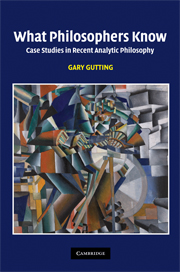Book contents
- Frontmatter
- Contents
- Acknowledgments
- Introduction
- PART I HOW DOES THAT GO? THE LIMITS OF PHILOSOPHICAL ARGUMENT
- PART II ARGUMENTS AND CONVICTIONS
- PART III PHILOSOPHICAL TRUTH AND KNOWLEDGE
- 9 Rorty against the world: philosophy, truth, and objectivity
- 10 Philosophical knowledge: conclusions and an application
- References
- Index
9 - Rorty against the world: philosophy, truth, and objectivity
Published online by Cambridge University Press: 05 June 2012
- Frontmatter
- Contents
- Acknowledgments
- Introduction
- PART I HOW DOES THAT GO? THE LIMITS OF PHILOSOPHICAL ARGUMENT
- PART II ARGUMENTS AND CONVICTIONS
- PART III PHILOSOPHICAL TRUTH AND KNOWLEDGE
- 9 Rorty against the world: philosophy, truth, and objectivity
- 10 Philosophical knowledge: conclusions and an application
- References
- Index
Summary
In this concluding case study, I turn to the work of Richard Rorty on the nature of philosophy. Rorty began as a practitioner of analytic philosophy and always gave it a central role in his thinking. Nonetheless, after the publication of Philosophy and the Mirror of Nature (1979), he became a bête noire for many analytic philosophers, who saw him as trying to undermine their enterprise by irresponsible defenses of outrageous claims. Others, myself included, find his work an engaging meld of erudition, penetration, and iconoclasm, which, even at its most problematic, always informs and stimulates. For our purposes, Rorty's work is of particular interest for its distinctive mode of philosophical argumentation, for the skeptical view of traditional philosophy defended by that argumentation, and for a perspective on the nature of the truth attained by philosophical knowledge.
RORTY'S PRAGMATIC METAPHILOSOPHY
Philosophy and the Mirror of Nature remains the only fully and systematically developed expression of Rorty's views on the nature of philosophy. However, his position significantly changed over the last quarter-century, and he came to prefer explaining and defending his ideas not through unified treatises but in a mosaic of independent essays on intertwined topics. I begin by examining a set of four such essays, which Rorty grouped together, under the general heading “Philosophy's Place in Culture,” in the collection he published shortly before his death in 2007.
Information
- Type
- Chapter
- Information
- What Philosophers KnowCase Studies in Recent Analytic Philosophy, pp. 197 - 223Publisher: Cambridge University PressPrint publication year: 2009
